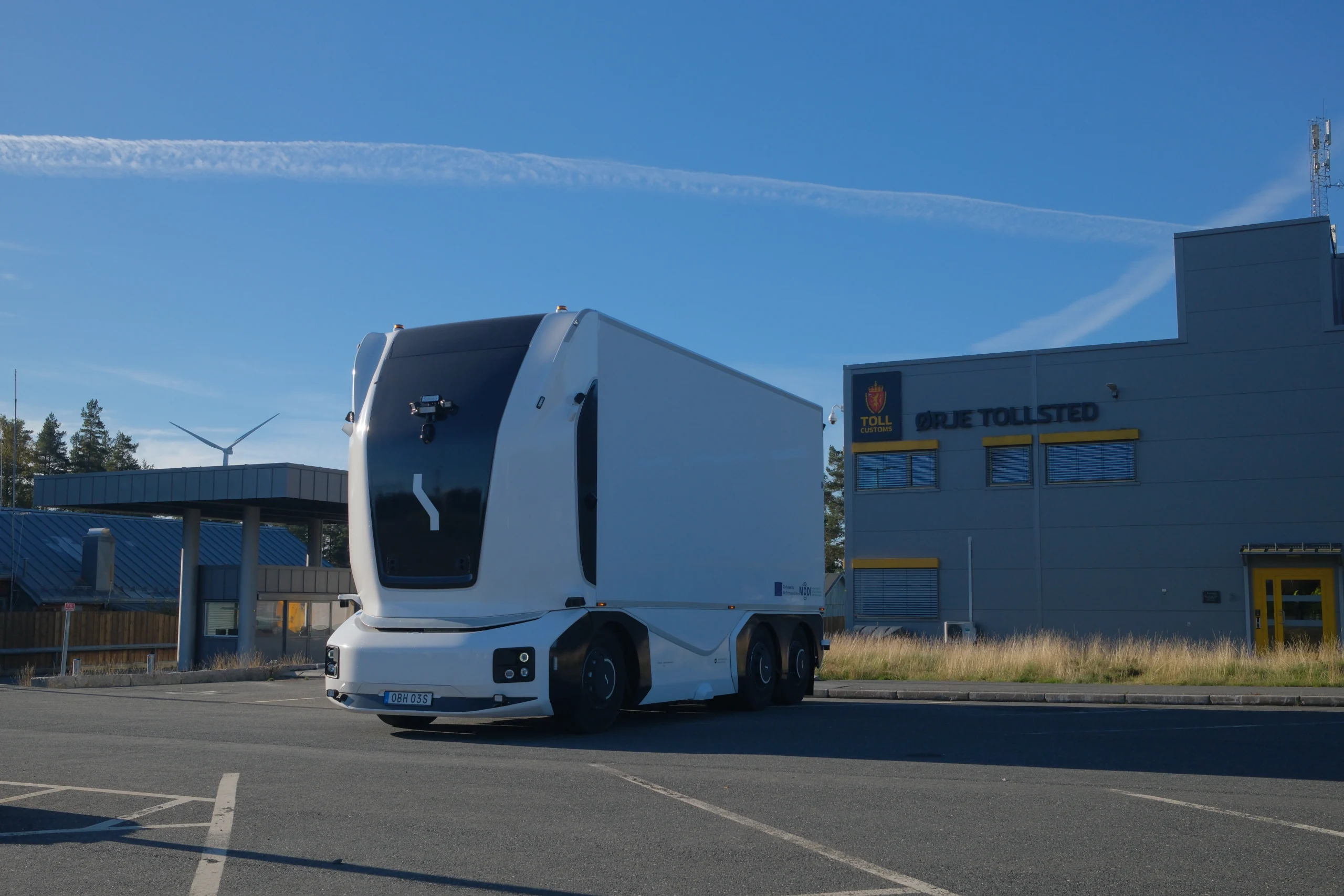Watch: driverless electric lorry makes history with world’s first border crossing

John E. Kaye
- Published
- News, Technology

A cabless electric lorry, dubbed a “space-age milk float”, has become the first driverless vehicle in the world to cross an international border and clear customs entirely on its own
A driverless electric lorry has become the first of its kind to cross a national border, after making a fully autonomous delivery from Sweden into Norway.
The crossing, carried out at Ørje on behalf of logistics group PostNord, marks a world-first for a cabless electric vehicle operating without a human driver.
Customs clearance was completed without a driver on board, using cooperative technology developed with Norwegian firm Q-Free. The system linked the vehicle to Norway’s Digitoll digital customs platform, allowing goods to be declared in advance and the crossing to proceed seamlessly.
The trial, part of the EU co-funded MODI project, is designed to test how autonomous transport can be safely rolled out across Europe.
Cross-border operations are considered one of the biggest hurdles for autonomous freight because of differing national regulations, inconsistent road signage and complex border procedures. Norway’s customs authority, Tolletaten, backed the project, calling it highly relevant to the future of international freight.
Henrik Green, Chief Technology Officer and General Manager for Einride Autonomous Technologies, said: “We are immensely proud to have completed the world’s first cabless, electric, fully autonomous cross-border delivery. We are dedicated to continuously extending our capabilities into new applications, showcasing how autonomous technology can enhance transportation safety, efficiency, and sustainability. The MODI project perfectly embodies this commitment, assisting in the realisation of EU value-based objectives by thoughtfully balancing safety with innovation.”
The lorry forms part of a broader package of autonomous technology developed by Einride, the Swedish company behind the project. Its system combines the Einride Driver autonomous software stack, a purpose-built cabless vehicle, and a remote “Control Tower” platform that allows fleets to be monitored and managed off-site.
The company says the technology is designed to improve safety, efficiency and sustainability in heavy road freight.
The MODI project brings together public and private partners from Sweden and Norway, including Statens Vegvesen, Sintef, Q-Free, Trafikverket and Østfold kommune.
PostNord, which handles almost 200 million parcels a year across the Nordic region, said the trial underlined how automation could change logistics. May-Kristin S. Willoch, the company’s Head of Environment, said: “Taking part in this historic milestone demonstrates how autonomous and digital technologies can reshape the future of transport, reduce emissions, and improve safety. This achievement is not just about crossing a border – it’s about entering a new era for the logistics industry.”
READ MORE: ‘Dubai and Pony.ai unveil Robotaxi partnership as autonomous mobility plans accelerate’. The Dubai Roads and Transport Authority (RTA) and Chinese autonomous vehicle company Pony.ai have officially unveiled their joint robotaxi programme, marking a significant step forward in the city’s ambition to convert 25% of all journeys to autonomous transport by 2030
Do you have news to share or expertise to contribute? The European welcomes insights from business leaders and sector specialists. Get in touch with our editorial team to find out more.
RECENT ARTICLES
-
 WPSL targets £16m-plus in global sponsorship drive with five-year SGI partnership
WPSL targets £16m-plus in global sponsorship drive with five-year SGI partnership -
 Dubai office values reportedly double to AED 13.1bn amid supply shortfall
Dubai office values reportedly double to AED 13.1bn amid supply shortfall -
 €60m Lisbon golf-resort scheme tests depth of Portugal’s upper-tier housing demand
€60m Lisbon golf-resort scheme tests depth of Portugal’s upper-tier housing demand -
 2026 Winter Olympics close in Verona as Norway dominates medal table
2026 Winter Olympics close in Verona as Norway dominates medal table -
 Europe’s leading defence powers launch joint drone and autonomous systems programme
Europe’s leading defence powers launch joint drone and autonomous systems programme -
 Euro-zone business activity accelerates as manufacturing returns to expansion
Euro-zone business activity accelerates as manufacturing returns to expansion -
 Deepfake celebrity ads drive new wave of investment scams
Deepfake celebrity ads drive new wave of investment scams -
 WATCH: Red Bull pilot lands plane on moving freight train in aviation first
WATCH: Red Bull pilot lands plane on moving freight train in aviation first -
 Europe eyes Australia-style social media crackdown for children
Europe eyes Australia-style social media crackdown for children -
 These European hotels have just been named Five-Star in Forbes Travel Guide’s 2026 awards
These European hotels have just been named Five-Star in Forbes Travel Guide’s 2026 awards -
 McDonald’s Valentine’s ‘McNugget Caviar’ giveaway sells out within minutes
McDonald’s Valentine’s ‘McNugget Caviar’ giveaway sells out within minutes -
 Europe opens NanoIC pilot line to design the computer chips of the 2030s
Europe opens NanoIC pilot line to design the computer chips of the 2030s -
 Zanzibar’s tourism boom ‘exposes new investment opportunities beyond hotels’
Zanzibar’s tourism boom ‘exposes new investment opportunities beyond hotels’ -
 Gen Z set to make up 34% of global workforce by 2034, new report says
Gen Z set to make up 34% of global workforce by 2034, new report says -
 The ideas and discoveries reshaping our future: Science Matters Volume 3, out now
The ideas and discoveries reshaping our future: Science Matters Volume 3, out now -
 Lasers finally unlock mystery of Charles Darwin’s specimen jars
Lasers finally unlock mystery of Charles Darwin’s specimen jars -
 Strong ESG records help firms take R&D global, study finds
Strong ESG records help firms take R&D global, study finds -
 European Commission issues new cancer prevention guidance as EU records 2.7m cases in a year
European Commission issues new cancer prevention guidance as EU records 2.7m cases in a year -
 Artemis II set to carry astronauts around the Moon for first time in 50 years
Artemis II set to carry astronauts around the Moon for first time in 50 years -
 Meet the AI-powered robot that can sort, load and run your laundry on its own
Meet the AI-powered robot that can sort, load and run your laundry on its own -
 Wingsuit skydivers blast through world’s tallest hotel at 124mph in Dubai stunt
Wingsuit skydivers blast through world’s tallest hotel at 124mph in Dubai stunt -
 Centrum Air to launch first European route with Tashkent–Frankfurt flights
Centrum Air to launch first European route with Tashkent–Frankfurt flights -
 UK organisations still falling short on GDPR compliance, benchmark report finds
UK organisations still falling short on GDPR compliance, benchmark report finds -
 Stanley Johnson appears on Ugandan national television during visit highlighting wildlife and conservation ties
Stanley Johnson appears on Ugandan national television during visit highlighting wildlife and conservation ties -
 Anniversary marks first civilian voyage to Antarctica 60 years ago
Anniversary marks first civilian voyage to Antarctica 60 years ago



























